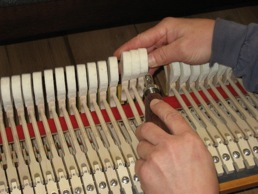Piano voicing is the “final frontier” in piano preparation. Intelligent voicing only takes place after all remedial work has been done to make sure the piano is functioning, mechanically, at its highest level. Traditionally, when we speak of piano voicing, we are referring to the manipulation of the hammer felts in order to achieve a specific change in tonal qualities. Needles, chemical hardeners, chemical softeners, steam, sandpaper of varying grits, and heat are all commonly used tools with which we can alter the tonal character of any piano.
On the concert stage, minor voicing is very often needed to keep the piano perfectly even, tonally, throughout it’s career. In the home, piano voicing is all too often a lost or disregarded art. I have rarely encountered a piano that could not be improved through judicious voicing. Even (especially) brand new pianos can and should be voiced to enhance the qualities of tone that it’s owner finds desirable.
Too often piano owners are unaware that their piano does not have to sound the way it does, and, too often piano technicians make no mention that there are things that can be done to improve the sound of individual pianos. If you have ever wished your piano could sound better, it probably can.


